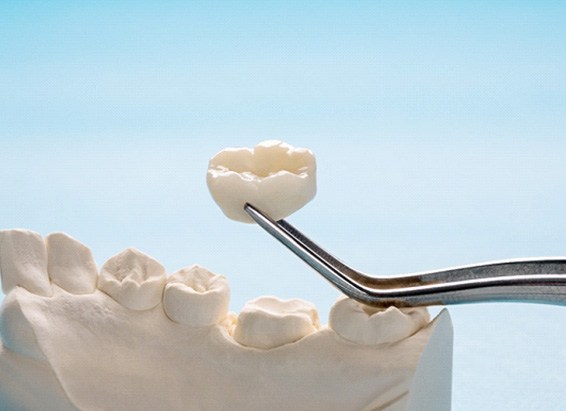Dental Crowns – York, PA
Greater Protection, Healthier Smiles
Chipped, cracked, or severely decayed teeth need optimal protection if they are to heal and strengthen over time. At Aesthetic Dental Arts, Dr. Singh and our team aim to provide just that by using customized dental crowns in York. Designed to fit over the visible portions of teeth, they offer a secure barrier that reduces the chances of future reinfection or damage. If you believe you might need a dental crown to treat one or more of your teeth, call our office to schedule an appointment.

Why Choose Aesthetic Dental Arts for Dental Crowns?
- Added Convenience with Weekend & Late Evening Appointments
- We Welcome Your Dental Insurance
- Digital Impression Scanner for Easy & Comfortable Care
What is a Dental Crown?

Unlike dental fillings that only treat cavities that penetrate the enamel, dental crowns are made using a variety of materials and offer a greater level of protection. Fitting over the visible surfaces of teeth, dental crowns are customized based on the designated shape, size, and color of impacted pearly whites.
Often requiring at least two appointments to complete, they can last 10-15 years as long as you commit to taking proper care of them year after year.
Do I Need Dental Crowns?

Knowing whether or not you need a dental crown is determined by your dentist. During a regular appointment, Dr. Singh will examine your smile and take digital images to determine if decay or damage exists on the surface or beneath the gumline. Depending on the results, you may or may not be recommended for a dental crown.
The most common reasons our team will suggest this type of treatment include:
- Severe dental decay is evident and putting nearby healthy teeth at risk of infection
- There is a filling that has expanded and is causing the impacted tooth to sustain additional damage
- The tooth or teeth in question are damaged or decayed
- You received a root canal or dental implant and need a custom restoration to rest on top
The Dental Crown Process

To receive a dental crown, you must first meet with your restorative dentist to discuss the severity of the problem and how best to move forward. After clearing out the tooth of any existing decay or damaged areas, we will fill it to create a tight seal.
The next step is to prep the tooth. This includes altering it so that a future dental crown will fit perfectly in place.
After taking digital impressions of your teeth, we will note specifications for lab technicians who will create your custom restoration. You’ll be fitted with a temporary crown, which you will wear in between appointments.
When ready, we will have you return to our office to have the temporary crown removed and the permanent one put into place.
The Benefits of Getting a Dental Crown

The benefits of dental crowns cannot be overlooked, as they have been used by dental professionals for decades to improve and restore broken and decayed smiles.
Some of the greatest advantages you can expect when it comes to receiving dental crowns include:
- The ability to use your teeth like normal, so eating and speaking are no longer an issue
- Improved confidence in the look and feel of your smile
- A crown that can last a decade or longer before needing replacement
Dental Crown FAQs

Over 15 million people in the United States have had at least one dental crown placed. If you’re planning on getting a crown of your own in the near future, now is the time to let our team know if you have any questions about the process. Since we care about making sure that our patients are as fully informed about their care as possible, we have taken the time to answer a number of particularly common dental crown questions in the FAQs below.
Are Dental Crowns Permanent?
Dental crowns are not actually permanent, but they can potentially last a very long time. Some individuals are able to keep their crowns for as long as 15 years. Furthermore, you can extend the lifespan of your crown by practicing good oral hygiene, taking precautions to protect it from damage (such as wearing a mouthguard while playing sports), and attending regular checkups and cleanings.
Note that even though dental crowns don’t last forever, the process of having them placed involves making permanent changes to the tooth in question by removing small amounts of enamel. This means that the affected tooth will always require a crown or another type of restoration to keep it safe.
Does It Hurt to Get a Dental Crown?
A topical anesthetic will be applied to the area around the tooth receiving the crown; this goes a long way toward helping you stay comfortable during your treatment. (Note that while the tooth will typically have to be numbed during the initial preparations, it isn’t always necessary to do so during the actual crown placement.) After your treatment, you can take over-the-counter pain medication to help with any sensitivity that you may be experiencing. Let us know immediately if your discomfort seems to grow more severe over time.
Do Dental Crowns Get Cavities?
No, they do not. While crowns can be designed to look and feel natural, they ultimately are not made out of the same material as your real teeth and thus are not susceptible to cavities. However, teeth that are covered by crowns still have roughly the same chances of suffering from decay as other teeth. If you want to prevent cavities from forming in the crowned tooth, you need to make a point of brushing and flossing thoroughly every day.
What Can I Eat with a Temporary Crown?
While you’re wearing a temporary crown, you should make a point of avoiding hard or sticky foods that might cause problems for your restoration. Common examples include hard breads, popcorn, chewing gum, caramel, and hard candy. Also, you should be wary of hot or cold foods that might affect the cement holding the temporary crown in place. If you’re not sure whether a certain type of food will be safe to eat while you have a temporary crown, feel free to ask one of our team members.



